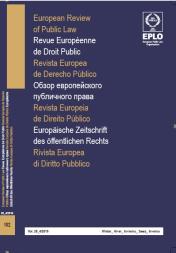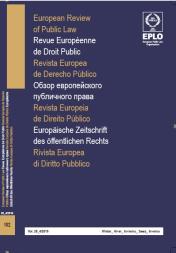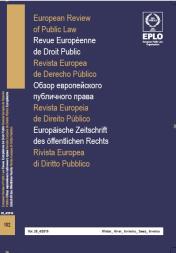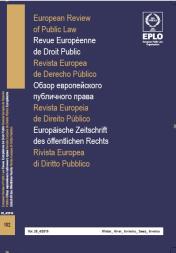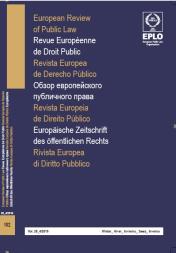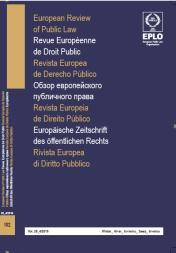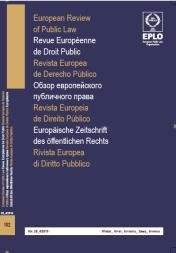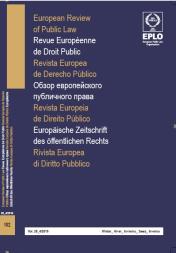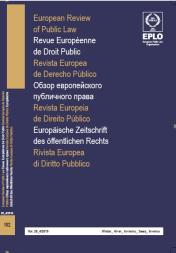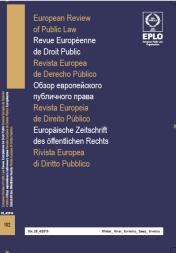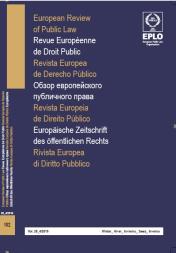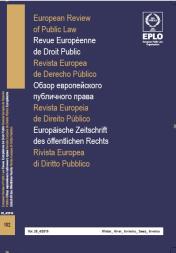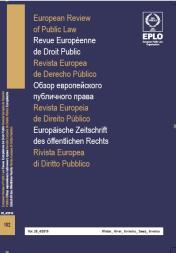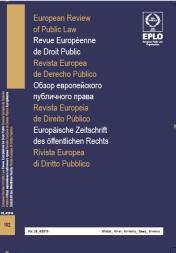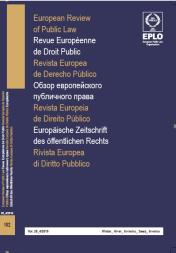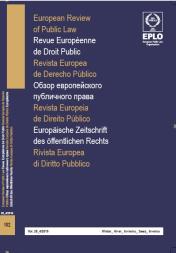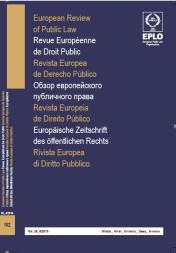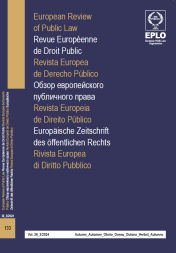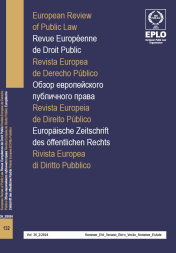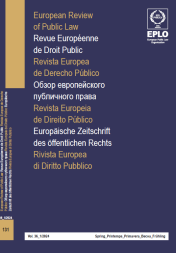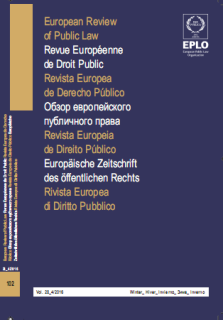
ERPL
vol. 28, no 4, winter/hiver 2016 (102)
This ERPL issue is proudly publishing an article by H.E. the President of the Hellenic Republic Prof. Prokopios Pavlopoulos on “The Principle of Solidarity in the Context of the Primary European Law”. The article is based on the President’s speech pronounced on 28 November 2016 in Athens, on the occasion of the 20th Anniversary from the foundation of the Hellenic Observatory of the London School of Economics and Political Science. The author studies the major challenges European Law faces with respect to the principle of solidarity, which however emerges as a vital mechanism for addressing and managing serious crises, including the European debt crisis and immigration and refugee policy.
Several articles follow in this ERPL issue. First, an article examines the independence of Supreme Audit Institutions (SAIs) that every EU Member State has in whatever form (Court of Audit, Audit Office, etc.). This independece is evaluated first by the legal safeguards taht surround it and ensure it and second by the budgetary autonomy granted to it. It is concluded that the SAIs display the required characteristics in order for them to be considered independent in terms of international standards. The next article takes into consideration the questions and answers raised in the attempt of the EU, also through the “banking union”, to respond to the economic crisis subsequent to 2006. After taking into consideration both regulatory developments and new areas of relevant administrative skills, the study tries to prove that the “banking union” represents a new model of European administrative law. The interlocutory procedures in the award of a contract on public works, public supplies or public services are examined in the following article, which deals more in particular with the Greek regime on interim measures on public contracts award. A very topical issue, focusing on the various, quite intense reactions, in the UK and elsewhere, produced by the - very close - result of the UK referendum of June 23rd, 2016 (regarding the Kingdom’s future position within, or not, the EU), is dealt with by the next article. Reminding William Shakespeare’s story of Oberon and Titania in A Midsummer Night’s Dream, the author maintains that we should remain optimistic as to whether there could be proper answers to solve the new situation produced based on the common law and the EU law (especially taking in mind the rationale of Art. 50 TEU and British constitutional structures). The following article deals with the issue of legal protection of same-sex relationships in Aruba, Curaçao and Sint Maarten, taking into consideration that the fourth autonomous country of the Kingdom of the Netherlands, the Netherlands, is already providing a high level of protection on that matter. The article maintains that this situation needs to change, noting that this process appears to already take place in Aruba. The final article in this ERPL issue deals with the Constitutional Courts’ mandate in reviewing last instance decisions of ordinary courts and examines the limitations to which this review has to be subject.
In the section of Chronicles of Constitutional Law, the first one, coming from Germany, discusses developments in the field, such as the amendments on Art. 91b Basic Law in order to facilitate cooperation between the federal and the Länder governments in the promotion of scientific research and teaching, the decision to open the German borders for refugees, decisions by the Federal Constitutional Court on the limits of the German participation in the EU, decisions on state organization, as well as decisions in the field of basic rights.
The second chronicle, coming from Greece, reviews Law 4443/2016, which, in the light of an economic and social crisis, made all the more complex by the massive waves of transit refugees and immigrants, attempts to address the state of play on the protection and implementation of the principle of equal treatment in the public and private sector and on the establishment of an independent and effective mechanism for investigating arbitrary acts by enforcement agents and prison guards.
The third chronicle in this section comes from Latvia and is divided into two parts: the first part analyzes the legal status of the State President as well as the regulation of and possible changes in presidential elections. It goes on analyzing the legal framework of termination of the work of the Cabinet of Ministers reflecting on the concrete resignation case of the Prime Minister in 2015. The second part examines the Constitutional Court’s jurisprudence in 2015, for example in cases on the limitation of the freedom of speech, the constitutional and international identity of the national flag, tax law etc.
The following chronicle on Constitutional Law first examines the political landscape in Poland in 2015 following important presidential and parliamentary elections as well as a nation-wide referendum on single-seat constituencies, public financing of political parties and fiscal law. New legislation adopted on social dialogue between government, trade unions and employers and acts modifying the electoral code are also discussed. The chronicle then examines the Constitutional Court’s most important judgments on fundamental rights protection and concludes by discussing the most serious constitutional crisis in Poland after 1989.
The chronicle on Serbian Constititutional Law summarizes the main points on the process of the current Constitution’s adoption and the criticisms and proposals for constitutional reform so far presented in the Serbian public with the aim to serve both as a presentation of the current situation and as a reminder for domestic actors on the need to keep this issue high on the political agenda.
The final chronicle in the section on Constitutional Law, reviews the most relevant constitutional and political events in Spain in 2015. It reflects on the results of the elections to the Spanish Parliament which broke the traditional bipartisanship characterizing the regime of 1978 as well as on the results of municipal elections held throughout the national territory and of autonomous elections in the Autonomous Communities under the ordinary regime and of elections to the Parliaments of Andalusia and Catalonia. It then examines Law 39/2015 on the Common Administrative Procedure of Public Administrations and Law 40/2015 of the same date, on the Legal Regime of the Public Sector. Finally, it emphasizes the Constitutional Court’s judgement that declares unconstitutional the resolution 1/XI of the Parliament of Catalonia adopted in November 2015, concerning the beginning of the political process in Catalonia.
Next, in the section on Administrative Law, the first chronicle reflects on the importance that the German Federal Adminstrative Court attributes to the building and the planning law as well as on the increasing importance of the environmental law in the Court’s jurisdiction. Finally, the jurisdiction of the Court in the field of the freedom of information gets more and more sophisticated.
The second chronicle in this section, coming from Finland, reviews the developments in the reform of healthcare and social welfare services, knows as SOTE, which has changed into a country government reform. The reform of the pension system, the new Act on Public Contracts and Service Concessions, the fees charged for proceedings in administrative courts are some of the other topics examined in this chronicle.
The third Administrative Law chronicle presents the results of the annual Conference of the University of Wrocław and of the Jagiellonian University, which focused on the theme of anti-values in administrative law. It then presents some new important legislation on landscape protection, consular law, freedom of assembly etc. as well as important judgments of the Polish Constitutional Tribunal, among which those on the abolition of the professional self-management of urbanists, the conscience clause for doctors, the monetary administrative sanctions and changes in the pension funds. Finally, the chronicle refers to the 35th anniversary of the establishment of the High Administrative Court.
The final chronicle in this section briefly presents the Organic Laws 1/2016 and 2/2016, both of October 31, adopted to observe the obligations imposed to Spain by the EU and to speed up a second call of general elections respectively. It then examines Law 39/2015 on the Common Administrative Procedure of Public Administrations and Law 40/2015 on the Legal Regime of the Public Sector which govern the core of the Spanish Administrative Law and entered into force after a “vacatio legis” period of one year.
This ERPL issue continues with the presentation of books received by the EPLO Library whereas an Analytical Table of Contents of all four ERPL issues of the year 2016 concludes the issue.
Summary
V. Ferraro, The “Banking Union”: A New Model of European Administrative Law [IN ENGLISH]
L. Delgado, Legal Protection of Same-sex Relationships - The Case of Aruba, Curaçao, the Netherlands and Sint Maarten [IN ENGLISH]
U. Karpen, Temptations to Overstretch Constitutional Courts’ Mandates to the Disadvantage of Supreme Courts [IN ENGLISH]
Chronicles
I. Constitutional Law
Th. Gross, Federal Republic of Germany [IN GERMAN]
A. I. Pottakis, Greece [IN ENGLISH]
A. Rodiņa / A. Kārkliņa, Republic of Latvia [IN ENGLISH]
K. Wojtyczek, Poland [IN ENGLISH]
J. Jerinić, Serbia [IN ENGLISH]
F. M. García Costa, Spain [IN SPANISH]
II. Administrative Law
M. Brenner, Federal Republic of Germany [IN GERMAN]
K. Kuusikko, Finland [IN ENGLISH]
J. Człowiekowska, Poland [IN FRENCH]
A. Villanueva Cuevas, Spain [IN SPANISH]
Analytical Table















